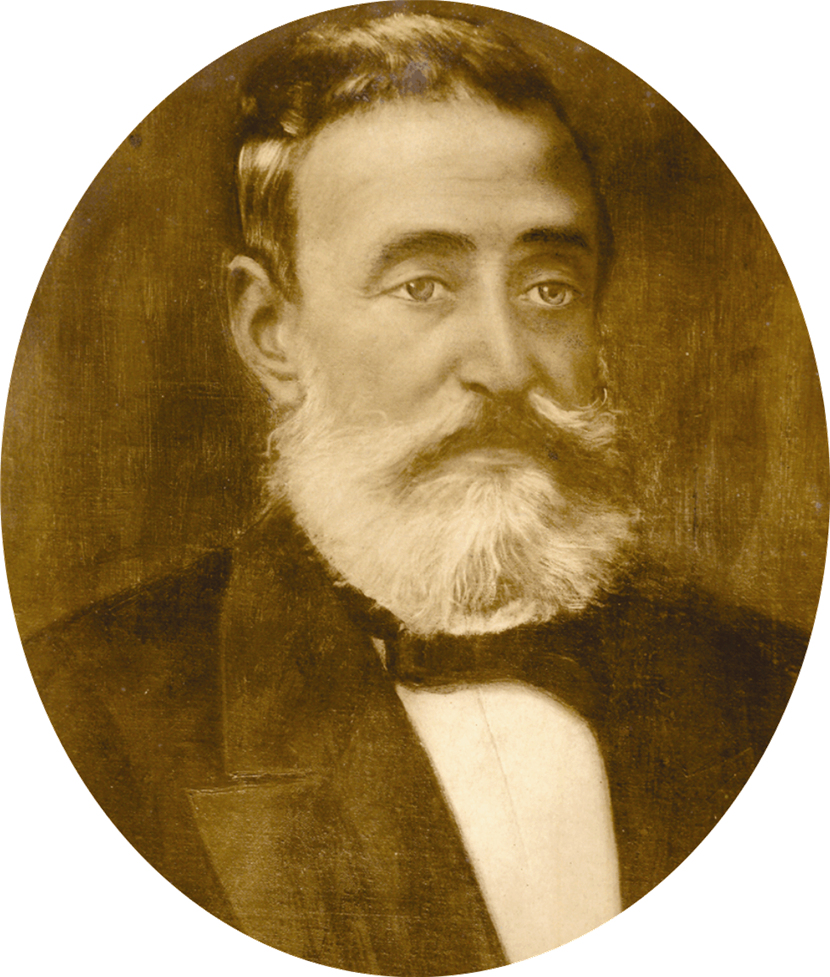The son of Chief Surgeon José Antonio Martins and Rita Angélica de Jesus, Antonio Felix Martins was born on November 20, 1812, in the city of Rio de Janeiro.
He graduated in medicine from the now defunct College of Medicine of Rio de Janeiro (current Federal University of Rio de Janeiro – UFRJ) in 1833, where he would go on to become a Professor of General Pathology. Moreover, Dr. Felix Martins worked as a medical practitioner at the Royal Imperial Chamber and was a Member of the now defunct Comissão Central de Saúde Pública (Public Health Council), in addition to serving as Inspector at the discontinued Maritime Hospital of Santa Isabel in the city of Niterói and as President of the also closed Junta Central de Higiene Pública (Public Hygiene Central Board).
Furthermore, the physician was appointed by a 1843-issued decree to take on the role of Inspector for Port Health (ship sanitation), where he helmed key efforts to help tackle the cholera and yellow fever epidemics that ravaged Rio de Janeiro during the second half of the 19th century.
Appointed as a Full Member of the former Imperial Academy of Medicine, Dr. Felix Martins’s inauguration at the institution took place on October 15, 1835, and on May 18, 1861, he was elected its President, remaining in the position until 1864. Two years later, in 1866, he joined the prestigious group of Honorary Full Members.
Moreover, the physician was bestowed the title of Correspondent Partner of the Medical Association of Liège, Belgium, thanks to his contributions to the field of the sciences. He was further appointed as an Imperial Advisor through a December 11, 1875-issued decree and granted the title of Barão de São Felix (Baron of São Felix). Finally, Dr. Felix Martins was decorated with the titles of Commander of the Imperial Order of the Rose and Commander of the Imperial Order of Christ.
In the realm of politics, he served as a Town Councilor in 1844, as a Congressman from 1847 to 1848, and as President of the City Council of Rio de Janeiro from 1851 to 1852.
Following complications from a serious malaria-related infection, Dr. Antonio Felix Martins passed away in the city of Rio de Janeiro on February 18, 1892, at the age of 79.
In his honor, the Rua Princesa dos Cajueiros street in downtown Rio de Janeiro, where he lived for many years, changed its name to the Rua Barão de São Felix street through decree number 1165, issued on October 31, 1917.
Acad. Francisco Sampaio
Número acadêmico: 33
Cadeira: 32
Cadeira homenageado: 32
Membro: Titular
Secção: Cirurgia
Eleição: 15/10/1835
Posse: 15/10/1835
Sob a presidência: Joaquim Candido Soares de Meirelles
Secção (patrono): Cirurgia
Falecimento: 18/02/1892

Número acadêmico: 33
Cadeira: 32
Cadeira homenageado: 32
Membro: Titular
Secção: Cirurgia
Eleição: 15/10/1835
Posse: 15/10/1835
Sob a presidência: Joaquim Candido Soares de Meirelles
Secção (patrono): Cirurgia
Falecimento: 18/02/1892

The son of Chief Surgeon José Antonio Martins and Rita Angélica de Jesus, Antonio Felix Martins was born on November 20, 1812, in the city of Rio de Janeiro.
He graduated in medicine from the now defunct College of Medicine of Rio de Janeiro (current Federal University of Rio de Janeiro – UFRJ) in 1833, where he would go on to become a Professor of General Pathology. Moreover, Dr. Felix Martins worked as a medical practitioner at the Royal Imperial Chamber and was a Member of the now defunct Comissão Central de Saúde Pública (Public Health Council), in addition to serving as Inspector at the discontinued Maritime Hospital of Santa Isabel in the city of Niterói and as President of the also closed Junta Central de Higiene Pública (Public Hygiene Central Board).
Furthermore, the physician was appointed by a 1843-issued decree to take on the role of Inspector for Port Health (ship sanitation), where he helmed key efforts to help tackle the cholera and yellow fever epidemics that ravaged Rio de Janeiro during the second half of the 19th century.
Appointed as a Full Member of the former Imperial Academy of Medicine, Dr. Felix Martins’s inauguration at the institution took place on October 15, 1835, and on May 18, 1861, he was elected its President, remaining in the position until 1864. Two years later, in 1866, he joined the prestigious group of Honorary Full Members.
Moreover, the physician was bestowed the title of Correspondent Partner of the Medical Association of Liège, Belgium, thanks to his contributions to the field of the sciences. He was further appointed as an Imperial Advisor through a December 11, 1875-issued decree and granted the title of Barão de São Felix (Baron of São Felix). Finally, Dr. Felix Martins was decorated with the titles of Commander of the Imperial Order of the Rose and Commander of the Imperial Order of Christ.
In the realm of politics, he served as a Town Councilor in 1844, as a Congressman from 1847 to 1848, and as President of the City Council of Rio de Janeiro from 1851 to 1852.
Following complications from a serious malaria-related infection, Dr. Antonio Felix Martins passed away in the city of Rio de Janeiro on February 18, 1892, at the age of 79.
In his honor, the Rua Princesa dos Cajueiros street in downtown Rio de Janeiro, where he lived for many years, changed its name to the Rua Barão de São Felix street through decree number 1165, issued on October 31, 1917.
Acad. Francisco Sampaio